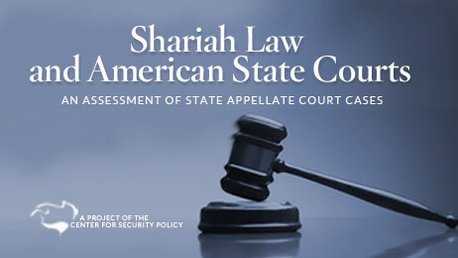Shariah Law and American State Courts: An Assessment of State Appellate Court Cases
This study evaluates published appellate legal cases that involved “conflict of law” issues between Shariah (Islamic law) and American state law.

In addition to the legal and academic literature on Shariah law in the U.S., a study of Islamic law in the U.S. was conducted by Emory Law School in 1999, which resulted in numerous country reports focusing particularly on issues of reform and personal status of women under the Shariah. This study, “No Altars: A Survey of Islamic Family Law in the United States,” includes a section on conflicts between Shariah and U.S. laws, including conflicts in the areas of polygamy, marriage to non-Muslims, forced marriages, and spousal abuse. The authors’ observations from twelve years ago apply even more today: “Some Muslims are proactively interested in ways to legitimately opt out of United States legal norms that potentially conflict with their Islamic preferences.”7 The purpose of the Emory Law School project on Islamic Family Law (IFL) is described at the website: “The first objective of this Project is to verify and document the scope and manner of the application of IFL [Islamic Family Law] around the world, including Muslim communities living within predominantly non-Muslim countries.”8
Also of note, in a non-academic but still influential article published in 1993 originally in the print edition of The American Muslim9 by the American Muslim Council Deputy Director Issa Smith, “Native American Courts: Precedent for an Islamic arbitral system,” the author argued for a number of milestones that have since been achieved. These milestone include the creation of Muslim Bar Associations, and National Muslim Law Students Association, and the various organizations dedicated to the study of, promotion of, or enforcement of Shariah law in the U.S., which are listed in part later in this study:
Although the Muslim community in North America is vastly different from the Indian community, I feel that in developing a plan for the implementation of Muslim family law, we can in some ways imitate the paradigm of the tribal court system and its supporting network. In particular, I recommend that as a first step, supporting organizations dealing with Islamic family law be established immediately. A professional association of Muslims in the law field (of whatever specialty) is a must. A law school students’ support group should be formed, and Muslim youth should be encouraged to enter this field.
A second step would be to establish institutes in the U.S. which can supplement legal education with courses in Islamic family law. At the same time, pressure should be put on law schools to include courses in Shariah taught by Muslims. An idea suggested in several quarters and being developed by the American Muslim Council, is the moot court where students and legal experts can act out Muslim family court scenarios…
The process of implementing Muslim family law will not be accomplished overnight. Changes of their type take place very slowly in American society, and our community is far from being prepared for this tak [sic]. I commend the continental council of Masajid for organizing this conference, and bringing together so many workers and thinkers. I pray to Allah the real decisions are made here that can be implemented by those ready to work. However, I strongly urge that consideration be given to political realities and the sensitivities of the American public. Such a radical change in American law—allowing Muslims to take control over their family law issues—must be initiated from the indigenous Muslim community here in the United States. To have it seem that this initiative is originating from overseas or from organizations financed overseas, would create a very negative impression that would likely destroy this effort. [emphasis added]
United States-Based Muslim and Non-Muslim Institutions Supporting Shariah Law
United States universities and colleges are increasingly offering courses and specializations In Shariah law, including business schools, law schools and general courses. The academic study of all kinds of comparative law including Shariah is worthwhile; but in many cases, these courses may not provide full information on the conflicts between Shariah and Western legal traditions and values. In many cases, particularly for courses in Islamic Finance, they focus on the technical and operational aspects of the topic, without ever discussing the actual nature of authoritative Shariah law as understood and documented both here and abroad. This list does not include Muslim Bar Associations in many cities and states, the Muslim Lawyers Association, or the National Muslim Law Students Association. These groups are identified here to show the intent and extent of institutionalized study of Shariah law, as well as promotion and enforcement of Shariah law, in the U.S.
Shariah Scholars Association of North America (SSANA)10
International Society for Islamic Legal Studies11
Islamic Law Students Association12
Islamic Law Section, The Association of American Law Schools13
Karamah – Muslim Women Lawyers for Human Rights14
Islamic Legal Studies Program, Harvard Law School15
Cordoba University16
North American Fiqh Council17
North American Imams Federation18
Assembly of Muslim Jurists of America19
7 Asifa Quraishi and Najeeba Syeed-Mille, “No Altars: A Survey of Islamic Family Law in the United States,” Emory Law School, https://www.law.emory.edu/ifl/index2.html , accessed May 2, 2011.
8Islamic Family Law: Possibilities of Reform Through Internal Initiatives, Emory Law School, https://www.law.emory.edu/ifl/index2.html, accessed May 2, 2011.
9https://theamericanmuslim.org/tam.php/features/articles/native_american_courts_precedent_for_an_islamic_arbitral_system/0013143
10https://greatnonprofits.org/reviews/profile2/sharia-scholars-association-of-north-america
11https://www.isils.net/about/executive+board , accessed May 2, 2011
12https://www.ilsaku.justicediwan.org/home/showonepage/57.html
13https://memberaccess.aals.org/eWeb/dynamicpage.aspx?webcode=ChpDetail&chp_cst_key=43088344-2cef-40c9-b3ca-4e9f4307ecc4 , access
May 2, 2011, and audio from founding meeting here:
https://www3.cali.org/aals07/mp3/AALS%202007%20Islamic%20Law%20in%20the%20Constitutions%20of%20Muslim%20States%2020070105.mp3
14https://www.karamah.org/
15https://www.law.harvard.edu/programs/ilsp/
16https://www.siss.edu/
17https://www.fiqhcouncil.org/
18https://www.imamsofamerica.org/
19https://www.amjaonline.com/index.php
- Military Starship: How SpaceX Is About to Make America Globally Dominant - March 4, 2025
- The Cautionary Tale of Zheng He - December 4, 2024
- Frank Gaffney departs CSP after 36 years - September 27, 2024
